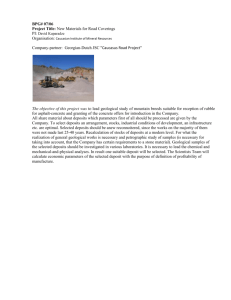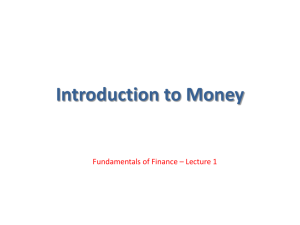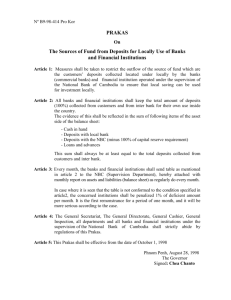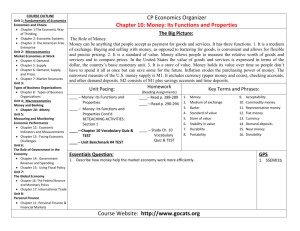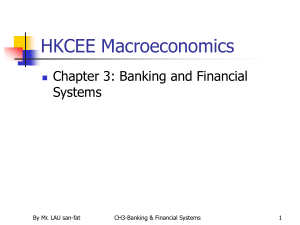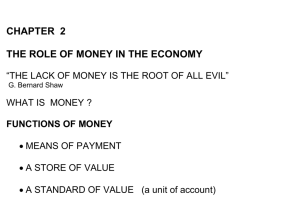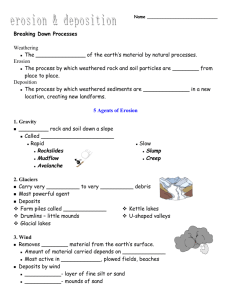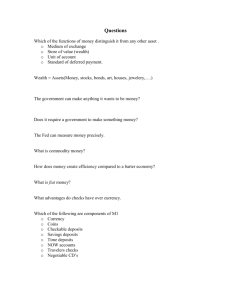CH1-National Income Accounting
advertisement
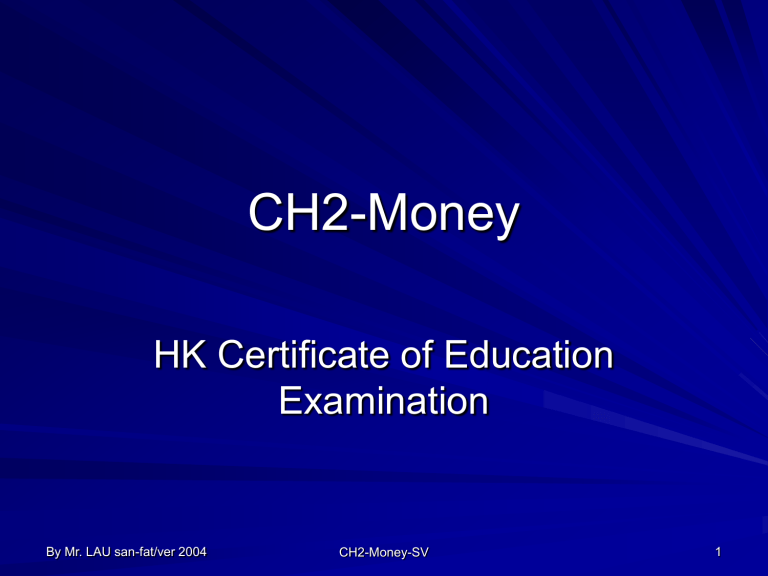
CH2-Money HK Certificate of Education Examination By Mr. LAU san-fat/ver 2004 CH2-Money-SV 1 The Barter Economy In a barter economy, without money, one good was directly exchanged for another. Problems/Disadvantages of Barter: – lack of double coincidence of wants very costly to find trading partners – most commodities are indivisible transactions of less than one unit of the commodity is highly impossible By Mr. LAU san-fat/ver 2004 CH2-Money-SV 2 The Barter Economy no common measure of value – trades are hindered by too many exchange rates Inconvenience By Mr. LAU san-fat/ver 2004 CH2-Money-SV 3 Functions of Money Money is anything that is generally accepted as a medium of exchange. Functions of money: 1. As a medium of exchange 2. As a unit of account/a common measure of value 3. As a store of value By Mr. LAU san-fat/ver 2004 CH2-Money-SV 4 Functions of Money Functions of money: 4. As a standard of deferred payment Future payments expressed in terms of money ‘means’ of deferred payments ‘standard’ of deferred payments (e,g, credit card) 5.As a means of payment – e.g. money, cash coupons & bank draft By Mr. LAU san-fat/ver 2004 CH2-Money-SV 5 The Evolution of Money Commodity money, e.g. shell, salt & metal – Problems: inconvenience & inadequate metals Convertible paper money – Fully convertible into the same amount of gold & silver Fiat money/Non-convertible money/Token money(i.e. coins & banknotes) By Mr. LAU san-fat/ver 2004 CH2-Money-SV 6 The Evolution of Money Deposit money – Demand deposits (in current account) – Savings deposits – Time/Fixed deposits (with fixed period of maturity) – Negotiable/Transferable certificate of deposits, CDs By Mr. LAU san-fat/ver 2004 CH2-Money-SV 7 The Evolution of Money Deposit money – Factors affecting choice of bank deposit: 1. Liquidity: degree of ease of drawing money out – With Easy Pay System & Automatic Teller Machines (ATM), savings & demand deposits become the most liquid deposits while time deposits are the most illiquid deposits. 2. Interest earning – CDs & time deposits carry higher interest rates while time deposits almost zero. 3. Certainty of earnings – CDs & time deposits guarantee the amount of interest earned while the interest rates for savings & demand deposits varies frequently By Mr. LAU san-fat/ver 2004 CH2-Money-SV 8 The Evolution of Money Electronic money – – – – Certain instruments or cards (e.g. EPS card & Octopus card) used for making payments through an electronic system (e.g. ETC, Money Link, JETCO) The amount of money billed will be directly transferred from the consumer’s account into that of the seller As a means of payment Making money less important in daily transactions but not leading to ‘moneyless’ society By Mr. LAU san-fat/ver 2004 CH2-Money-SV 9 Are Credit Cards money? As a medium of exchange? – No as it acts as a temporary medium of exchange only As a unit of account? – No the value of commodities is never expressed in terms of credit cards As a store of value? – No as it does not have any value or purchasing power in itself. By Mr. LAU san-fat/ver 2004 CH2-Money-SV 10 Are Credit Cards money? As a standard of deferred payment? – No as future payments cannot be expressed in terms of credit cards Conclusion: – Credit cards are NOT money but are classified as money substitutes. By Mr. LAU san-fat/ver 2004 CH2-Money-SV 11 Qualities of Good Money 1. Durable 2. Portable 3. Divisible 4. Homogeneous 5. Scarce or in restricted supply By Mr. LAU san-fat/ver 2004 CH2-Money-SV 12 Currencies in Hong Kong Notes are issued by three licensed banks (the HongKong and Shanghai Banking Corporation Ltd., the Standard Chartered Bank, and the Bank of China) & the Hong Kong Monetary Authority. Coins are issued by the HKSAR government Banknotes and government coins are legal tender. By Mr. LAU san-fat/ver 2004 CH2-Money-SV 13 Issuing Banknotes in HK 1. Surrender US$1 Exchange Fund 2. Receive a Certificate of Indebtedness 3. Obtain the right to issue HK banknotes of HK$7.8 Note-issuing Banks • HK’s currency system is called Foreign Exchange Standard. By Mr. LAU san-fat/ver 2004 CH2-Money-SV 14 Money Supply in Hong Kong Money Supply definition M1 = currency (i.e. notes & coins) in public circulation + demand deposits with licensed banks Money Supply definition M2 =M1 + time deposits with licensed banks + negotiable certificates of deposits issued by licensed banks & held by the non-bank public By Mr. LAU san-fat/ver 2004 CH2-Money-SV 15 Money Supply in Hong Kong Money Supply definition M3 =M2 + deposits with restricted licensed banks & deposit-taking companies + negotiable certificates of deposits issued by restricted licensed banks & deposit-taking companies held by the non-bank public By Mr. LAU san-fat/ver 2004 CH2-Money-SV 16 Money Supply in Hong Kong Money Supply definition M1 = currency (i.e. notes & coins) in public circulation + demand deposits with licensed banks – M1 emphasizes the function of medium of exchange Money Supply definition M2 =M1 + time deposits with licensed banks + negotiable certificates of deposits issued by licensed banks & held by the non-bank public – M2 emphasizes the function of store of value By Mr. LAU san-fat/ver 2004 CH2-Money-SV 17 Money Supply in Hong Kong Money Supply definition M3 =M2 + deposits with restricted licensed banks & deposit-taking companies + negotiable certificates of deposits issued by restricted licensed banks & deposit-taking companies held by the non-bank public – M3 emphasizes the function of store of value By Mr. LAU san-fat/ver 2004 CH2-Money-SV 18 Total Money Supply Definition Total money supply definition M1 =M1(HK$) + M1(foreign currency) Total money supply M2 =M2(HK$) + M2(foreign currency) Total money supply M3 =M3(HK$) + M3(foreign currency) By Mr. LAU san-fat/ver 2004 CH2-Money-SV 19 Effects of Payment by Phone Service (PPS) on Money Supply Case 1: debit demand deposits and credit savings deposits – M1 decreases – M2 remains unchanged – M3 remains unchanged Case 2: debit demand deposits and credit demand deposits – M1 remains unchanged – M2 remains unchanged – M3 remains unchanged By Mr. LAU san-fat/ver 2004 CH2-Money-SV 20 Effects of Payment by Phone Service (PPS) on Money Supply Case 3: debit saving deposits and credit savings deposits – M1 remains unchanged – M2 remains unchanged – M3 remains unchanged Case 4: debit savings deposits and credit demand deposits – M1 increases – M2 remains unchanged – M3 remains unchanged By Mr. LAU san-fat/ver 2004 CH2-Money-SV 21
